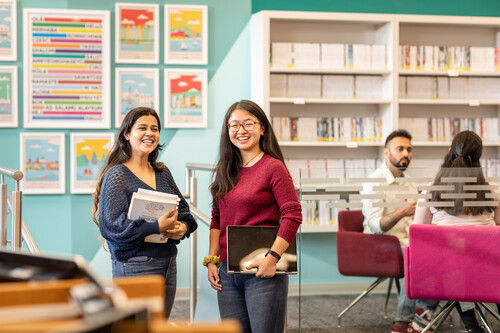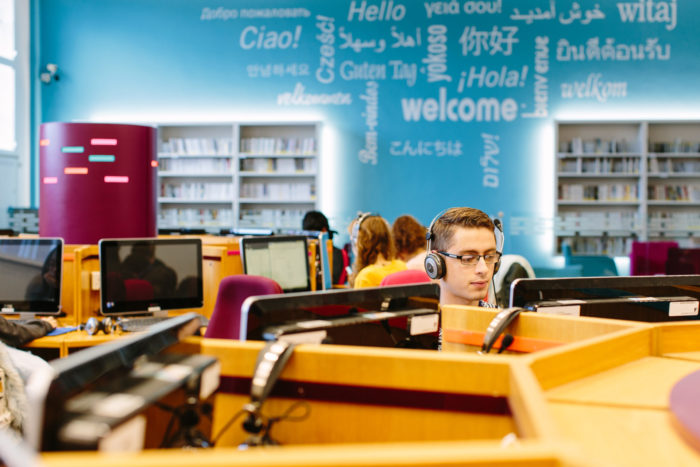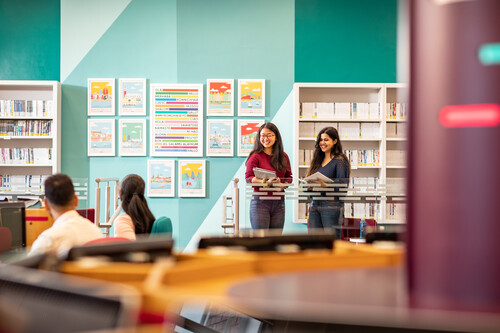How the Language Zone contributes to creating a sense of belonging in the Language Centre

By Carolin Schneider, Taj Muhammad, Danielle Tompkins, Eva Lafontan, Sabina Grahek, Anna Neville and Kate Simpson
This blog post gives an overview of extra-curricular activities held in the self-access centre, the Language Zone, at the University of Leeds during the summer term 2023. Activities included a range of sessions aimed at developing pre-sessional students’ English language skills and confidence. The Language Zone team is joined by student engagement assistants every summer - a role that is essential in connecting students with each other, the Language Centre and the wider university.
The Language Zone: "a home between homes"
The University of Leeds puts belonging at its heart and is keen that every student feels valued and engaged, getting the most from their time at university. This is an aim shared by many other Higher Education institutions, and this sense of belonging is deemed an essential factor in success engagement and success (see De Sisto et al., 2022; Farrell, 2008; Knifsend et al., 2018).
The Language Zone is a key part of this strategy and actively contributes to the engagement of language learners across campus, both in its physical and online spaces. It "aims to be a hub of language and intercultural learning for staff and students across the university by providing high quality resources, social learning and informal education spaces, and fostering and encouraging enthusiasm for language learning" (University of Leeds Language Zone Strategy 2023-25). The Language Zone is physically located in the Parkinson Building, the most recognisable building on campus, being part of the university logo. This adds to its capacity as a central point for Language Centre students and others to engage in a shared space that is open to everyone.

The iconic Parkinson Building, home of the Language Zone
As the self-access centre for the whole university, it contributes to inclusivity and the "social capital [of the university] through the relationships and interactions that occur between staff and patrons" (Johnson, 2012, p. 1). The Language Zone’s role, similar to any library, involves "building patrons' trust in the [service] and its staff, connecting people to both community and library resources, providing social support for patrons, reducing social isolation […], and providing a positive place for neighborhood residents to gather" (Johnson, 2012, p. 1).
In this context, the term neighbourhood can be interpreted as referring to the wider university and Leeds local communities. As discussed by Brewster and Cox (2023), "[t]he library can position itself as having no stake in student outcomes (such as degree classifications), so it is seen as an inclusive and impartial space" (p. 2). As a service similar to traditional libraries and with the same aims of student support, this is something the Language Zone can use as an advantage.
During the summer term, the Language Centre offers a range of pre-sessional courses for students learning English in preparation for their degree studies, mostly in the UK. As an integral part of the Language Centre, the Language Zone supports these courses through a programme of co- and extra-curricular activities. In this it often acts as a link between the Language Centre and the wider university, getting students used to engaging with course mates and others in English, both for their academic and non-academic activities.
It has been said that the Language Zone acts as ‘a home between homes’, a place for those preparing to immerse themselves in the large and busy campus life that will emerge at the start of the academic year in autumn (Poole and Schneider, 2021, p. 41). During the recent Covid-19 pandemic, the Language Zone focused more explicitly on creating and maintaining a sense of community, rather than relying on the existing language learning community to ‘look after itself’ and to keep going. This was initially achieved by offering learners (including staff) an online space to find out information and keep in touch with the Language Zone team and other learners (see Schneider, 2020).

Since returning to campus in summer 2021 this focus on community building and belonging has been at the forefront of Language Zone activities in the physical space, through making online and in-person sessions available to learners, also focusing on the importance of accessibility. The latter includes ongoing discussions with our accessibility contact in the faculty and may lead to slight changes or adaptations in the existing layout of our physical space. Students’ comments have been very positive, mentioning how the Language Zone service had contributed to building their confidence and English language skills. They also commented on the friendliness and kindness of the team. For example, one student said:
Language Zone not only helped me improve my language and allowed me to better bridge academic courses, but every tutor was very nice and gave me a lot of encouragement and help. It's like a big family here!
Another student encouraged others to benefit from the service, saying:
Do not worry about awkward or embarrassing if you don't know how to start/participate in an English conversation. When you have problem/confuses about English and life in the Leeds, do not hesitate to ask help in Language Zone, magic will happen once you try! I'm so much appreciate that I got immediately response when I ask for help. There is no reason to reject joining in! Thanks so much to every staff and participators.
Both comments show that students appreciated the atmosphere and environment of the Language Zone, for both their academic development and student experience. Building on this kind of feedback we approached this summer with a mix of tested and new ideas for engaging students.
The role of student engagement assistants
In 2023, the Language Centre hired two part-time Student Engagement Assistants, a role based in the Language Zone team. This role has developed into its current form during years of welcome activities within the Language Centre but also across campus. 2023 was the second year of the role in its current form.
The Assistants play a vital part in welcoming and supporting international students who come to study on University of Leeds Language Centre pre-sessional courses over the summer. They help organise and deliver weekly social and cultural events that aim to encourage students to develop a sense of community through interacting with other students. They also assist or participate in some classroom-based activities that are delivered by our academic staff.
Our Student Engagement Assistants in 2023 were Eva Lafontan and Taj Muhammad, who both studied at the University of Leeds at the same time as working in the Language Zone team. Having gone through the experience of being Leeds students already, they contributed to creating a vibrant, supportive learning environment within the Language Zone that provided pre-sessional students with ample opportunities to enhance their English language skills and foster a strong sense of belonging.
For example, Taj had attended Language Zone activities during his studies, before being hired as a Student Engagement Assistant, so was able to share his experience of growing confidence and improved language skills with students who were new to Leeds and to studying in the UK. His experience of studying and engaging with fellow students in this role attracted many, often from a similar background, to attend Language Zone activities during the summer term and to participate in activities with increased confidence, further nurturing a sense of belonging among all.
Similarly, Eva has a bilingual background and experience of studying abroad in the UK. Having worked as a Student Engagement Assistant in the Language Zone for two consecutive years and having also worked in other roles at the University, she was able to engage students with her broad knowledge and experience of life in the UK and Leeds.
Activities during the summer
The Language Zone team contributed to welcome activities by attending two Language Centre Welcome Events, which took place in the second week of pre-sessional courses (early July and early August). The aim of these events was to welcome students into the Language Centre and familiarise them with services available during their time at the University of Leeds.
The Language Zone team used these events to motivate students to visit the physical Language Zone space by running a treasure hunt, which covered the most important information we want students to have, such as opening times and where to find information about resources and extra-curricular activities. Students could win a Language Centre tote bag, which was well received. The treasure hunt certainly worked well for us in terms of encouraging students to explore the Language Zone spaces. We have not yet been able to establish if it has translated into students using the Language Zone more often or more successfully. Further user experience (UX) research is currently taking place. This initially involves observations and user interviews, which are easy to integrate into day-to-day interactions with users and other work. These approaches also require the least effort from users, as they don’t need to take much time out of their schedule to participate.

The Language Zone team offers a range of co-curricular activities, such as induction tours or tailored speaking activities. This summer term, these further included induction sessions where students used the space to work on course-related tasks or listened to other students’ experiences of studying at Leeds. These were interesting for the Language Zone team, as we got a better understanding of what students do in class and how we may be able to support this more effectively. For example, we may previously have underestimated the importance of the counter assistant’s opportunities to interact with students when they enter the space.
Eva and Taj, our Student Engagement Assistants, ran a weekly schedule of speaking activities, such as Let’s Chat, Conversation Confidence and Presenting with Confidence. While these were based on activities that are run by Language Zone staff during the rest of academic year, they were able to add their own experiences and expertise to the planning and delivery of these sessions. For example, they were able to share their own experiences as students at the University of Leeds, and their language learning journeys.
Throughout the summer, Language Zone has embodied the theme of ‘Building Bridges Beyond Borders’ by offering a variety of weekly activities as below:
- The Let's Chat in the Language Zone conversation activity engages students in informal discussions, helping them practise speaking and listening skills with Student Engagement Assistants and peers.
- During our Culture Chat event, international students exchange cultural experiences with peers from diverse backgrounds, promoting cultural awareness through arts, music, traditional food, and sports.
- The Board Games Club introduces language challenges and games, making language learning enjoyable and reinforcing vocabulary and language skills.
- Wednesday with the Language Zone is a relaxed and friendly session where students gather to improve their speaking skills, build connections, and boost their conversational confidence.
- Our Conversation Confidence sessions target students who worry about their speaking skills and their conversational fluency. We aim to create an informal and non-judgmental environment in the Language Zone, and this is especially important during these sessions. In these, students enhance their speaking skills across various settings, including casual chats, formal discussions, and public speaking, within a supportive environment that nurtures both confidence and knowledge.
- Presenting with Confidence provides students the opportunity to improve their presentation and public speaking skills, receiving constructive feedback and coaching from Student Engagement Assistants to enhance fluency and confidence.
The most popular, and therefore busiest, sessions were Board Games Club and Presenting with Confidence, as well as Wednesdays with the Language Zone, a session that had a different theme every week. Board Games Club was advertised in the Language Centre newsletter as "an activity to develop your language skills through playing games. This is a fun way to gain confidence and meet new people in a friendly environment". Some students appeared to be active board gamers already, which we didn’t necessarily know when we first developed the activity.
Presenting with Confidence was billed as a way to "improve your speaking confidence and presentation skills while having fun". Student feedback implied that the presentation skills session was seen as directly relevant to academic study.
Staff reflections
The Language Zone counter assistant is often the first point of contact for students entering the learning space, providing the opportunity for them to practise speaking English with a fluent speaker. This is an additional opportunity to the more formal activities and sessions offered by the Language Zone team, which requires no additional setup as such. Our current counter assistant Danielle has been born and educated in the UK and has completed her undergraduate studies and postgraduate research at the University of Leeds. This allows her to connect with language students through a shared experience, as well as being someone who can support them in their own language learning journey.
All members of the Language Zone contribute to a supportive and welcoming environment by ensuring that students are listened to and have an opportunity to contribute, either in one-to-one or group interactions. We often find that the need to build students’ confidence is at the heart of our interactions with them. This often involves framing responses to contribution positively and using positive reinforcement throughout any interaction.
During the summer term especially, the Language Zone fulfils an additional role as a place of transition, where students have the chance to get used to the University of Leeds environment and some of its norms. Not only have students arrived from other countries but they have often also left behind family and friends, so the Language Zone can offer opportunities to meet new people and form relationships, in order to form new communities and integrate into existing ones. We have found that regular participants or users of the learning spaces have the "extended contact needed for the establishment of community membership" (Tinto, 1988, p. 446) that is often seen as essential for student success (see Harrop and Hoppitt, 2023).
We invite ongoing feedback from students and staff to enable us to continuously improve, often as part of ad hoc in-person interactions or more regulated via surveys and graffiti boards. This includes discussions around what is relevant to students, for example when curriculum changes are implemented or when we see a change in cohort behaviour.
The different roles within the team all contribute to the overall vision and aims of the service and the wider university community, adding a wealth of knowledge and experience that can only be achieved in a diverse team.
Conclusion: user-driven improvement and evolution
The Language Zone team constantly and consistently work towards creating a learning environment that welcomes all learners and helps them to develop their skills in ways that are useful for them. This may include offering a quiet study space, a social learning environment, books or online materials, or another person to interact and learn with.
As part of the Language Zone’s ongoing development and improvement activities, we initiated a user research project last year. We are committed to user-driven improvement and evolution of our services, through gathering student feedback and monitoring engagement as part of our ongoing User Experience Project. This communication aims to ensure that the Language Zone remains relevant to student needs and is a constantly evolving collaborative project between students and staff to cultivate a strong sense of community and belonging.
References
- Brewster, & Cox, A. M. 2023. Taking a “whole-university” approach to student mental health: the contribution of academic libraries. Higher Education Research and Development. 42(1), pp. 33–47.
- Creese, A. and Blackledge, A. 2019. Translanguaging and Public Service Encounters: Language Learning in the Library. The Modern language journal. 103(4), pp. 800–814.
- Harrop, H. and Hoppitt, S. 2023. All carrot – no stick: an alternative award framework to enhance ‘international’ students’ sense of belonging and engagement in the extracurricular. London Review of Education. 2023. 21(1).
- Johnson, C. A. 2012. How do public libraries create social capital? An analysis of interactions between library staff and patrons. Library & Information Science Research. 34(1), pp. 52–62.
- Poole, J. and Schneider, C. 2021. Supporting extra-curricular language practice in on-line spaces: Crafting resilience through community building. In: Blaj-Ward, L., Hultgren, K. and Reichard, B. eds. Narratives of innovation and resilience: Supporting student learning experiences in challenging times. Renfrew: BALEAP: The Global Forum for EAP Professionals, pp. 41-47.
- Schneider, C. 2020. Setting up a language learning environment in Microsoft Teams. Studies in Self-Access Learning Journal, 11(3), pp. 263–270.
- Tinto, V. 1988. Stages of Student Departure: Reflections on the Longitudinal Character of Student Leaving. The Journal of Higher Education. 59(4), pp. 438–55. https://doi.org/10.2307/1981920
